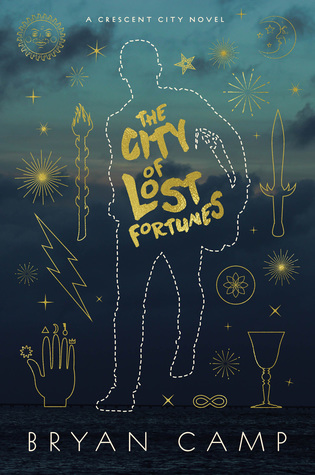The City of Lost Fortunes, by Bryan Camp. Houghton Mifflin Harcourt, 2018. 384 pages, $24.
The city of New Orleans has a particular ability to suck visitors into its own narrative. Maybe it’s the city’s abundance of stories that create such an intoxicating atmosphere—stories of power struggles, local legends, and wild nights. Maybe these stories marinate in the tropical heat, and become some bittersweet cocktail you just can’t put down—made up of the good, the bad, the ugly, and some other flavor you can’t put your finger on. We can’t be sure what it is, but there’s no doubt that New Orleans has a special type of magic, and whether it’s just liquor-soaked or actual old-world hoodoo, it’s nice to get caught up in, to straddle the line between reality and something a little more entertaining.
In the same way, books offer a taste of that dislocation, pulling you into a world that will make you forget the one you’re sitting in. Bryan Camp’s debut novel The City of Lost Fortunes realizes that feeling—of having one foot anchored in reality and another stepping into a world that is sprawling, mysterious, and unknown. The plot of the novel unravels somewhere between the observable and supernatural world. In this mystery/fiction novel, supernatural and spiritual legends from every culture are very real, coexisting within our world today, and challenge the reader to make sense of the need for mythology in modernity.
It’s 2011, six years after hurricane Katrina has ripped through New Orleans. Left in shambles after the storm, street magician and New Orleans native Jude Dubisson is attempting to rebuild his own life while the city does the same. Like New Orleans, Jude is battling the consequences of the storm, but on more levels than meet the eye. The bastard child of an unknown god, Jude has an inexplicable connection to the supernatural world, specifically through his magical ability to find lost things. When a debt that he owes to a fortune deity gets called in, Jude finds himself caught up in the gambling of gods, where both his own fate and the fate of New Orleans is at stake. Jude sets to work as a supernatural sleuth, crossing back and forth between worlds as he races to find the murderer of a god and change his own fate before time catches up with him.
This story is for any former child of fantasy, or those fascinated by mythology, astrology, or the toil-and-trouble witches of Macbeth. The City of Lost Fortunes features supernatural forces from multifarious cultures and regions, making it more interesting and intellectually complex than most fantasy geared toward young adults. Characters include a voodoo king, a Christian angel, a zombie, a Greek god, a vampire, and an Egyptian deity, in a mythology mash-up that could only make sense in New Orleans. The novel offers an interesting crossover between fantasy, mystery, and social commentary. Relaying the loss that hangs thick in post-Katrina New Orleans, the novel tells us the story not just of physical rebuilding, but also spiritual reconstruction. On one level, The City of Lost Fortunes is an anti-hero’s journey through a magical world that tickles our fancy for epic journeys, á la Tolkein and Rowling. On a more philosophical level, the book turns New Orleans into a minor pantheon of gods and explores humanity’s need for myths to make sense of what they can’t. And on the final, highest level, the novel is a multi-tiered love letter to ever-enduring New Orleans, that those of us similarly smitten with the microcosm’s cocktail just might think does it justice.
Kiera Reeves is a student at Loyola University New Orleans, majoring in creative writing. She spends most of her time reading and frequently annoys her friends by trying to tell them about what she’s reading.

